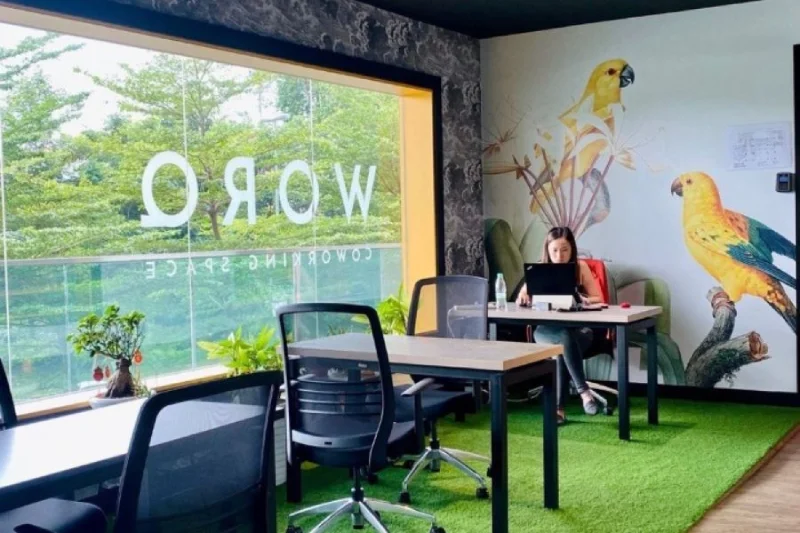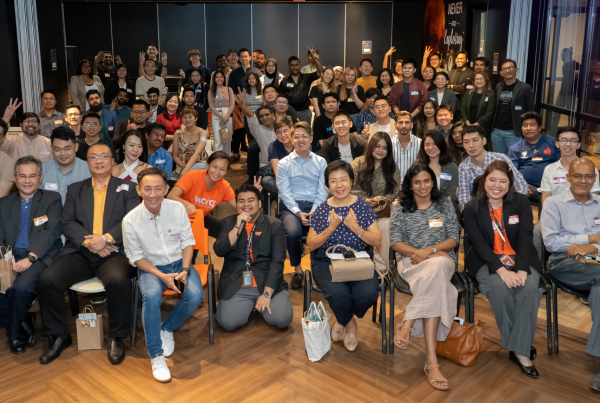The routine of working in a corporate office from 9 in the morning to 5 in the evening is slowly becoming an obsolete trend. Also, the trend of working from home is a thing of the past. Now is the era of coworking spaces and hybrid working trends.
As the future of work evolves, so should our thinking about workplaces. The conventional concept of requiring all employees to have an office is no longer viable, and coworking spaces will play an important part in the new dynamic work landscape.
What is a coworking space?
A coworking space is a shared office or workspace where people can work independently or collaboratively, typically as part of a community of independent workers or small businesses. Coworking spaces often provide amenities such as high-speed internet, printing and copying services, conference rooms, and sometimes even food and drinks.
They are designed to be flexible and accommodating, allowing people to work in a variety of settings and arrangements. Coworking spaces can be a good option for people who work remotely, freelancers, or small business owners who need a professional environment to work in but don’t want to lease their own office space.
What are the components of a good coworking space?
Here are some key components of a good co-working space:
1. Comfortable and functional workspaces: Co-working spaces should have a variety of workspaces, such as hot desks, private offices, and conference rooms, that are comfortable and conducive to productivity.
2. High-speed internet: Reliable, high-speed internet is essential for co-working spaces, as it enables people to work efficiently and stay connected with colleagues and clients.
3. Community: A good co-working space should foster a sense of community among its members. This can be achieved through regular events, networking opportunities, and other activities that bring people together.
4. Amenities: Co-working spaces should have amenities such as a kitchen, breakout areas, and possibly even a gym or other recreational facilities to help people feel comfortable and productive while they work.
5. Flexibility: Co-working spaces should offer flexible options for members, such as the ability to book workspace on a flexible basis, or the option to upgrade or downgrade their membership as needed.
6. Supportive staff: A good co-working space should have a team of helpful and supportive staff who are available to assist members with any questions or issues they may have.
Why is a coworking space important?

Businesses that provide a hybrid approach, where remote teams may utilize coworking spaces as well, benefit from having the “best of both worlds.” Here are five distinctive advantages coworking spaces provide for full-time workers, business owners, and independent contractors alike:
1. Possibilities for collaboration
Like-minded professionals occupy and fill coworking spaces, unlike the coffee shop over the block where you’ll rub shoulders with everyone from pensioners to college kids to a few digital nomads. This indicates that there are several chances to start a discussion with someone who possesses the skill set you’re seeking!
Utilising this special chance to network and attending on-site networking events is part of
making the most of a coworking space. This networking opportunity is especially important for
startup and entrepreneur founders. One of the most valued talents on the market today is
networking.
2. More effective boundaries and work-life balance
There is a growing danger of burnout as more individuals choose remote work since they don’t maintain a good work-life balance.
Certain locations are linked in our brains to particular activities. It’s becoming increasingly difficult for us to genuinely “log out” and finish the workday as more individuals choose to work from home. For people who find it difficult to maintain a work schedule when working remotely, going to a real workplace might be helpful.
Coworking facilities can also aid in establishing a distinct boundary between work and home. You are obviously finished for the day when you exit the workplace area. This enhances the general wellness and emotional health of remote workers and motivates them to unplug.
3. Less conflict at work and greater motivation
Consider a time when you worked in a conventional workplace. How much time did you waste learning unneeded details about your colleagues via rumors? How frequently were you interrupted by coworkers seeking your opinion on the most recent workplace politics? Because no one works for the same firm, coworking spaces greatly reduce office drama and gossip.
In coworking spaces, entrepreneurs, freelancers, and digital nomads all share a common workspace with remote employees from various sectors. This lessens idle chatter and makes dialogue more stimulating than it would be in a conventional workstation.
Additionally, the ability to easily change rooms if someone is being disruptive and the flexible nature of this style of working setting both contribute to a reduction in drama. Additionally, the ability to easily change rooms if someone is being disruptive and the flexible nature of this style of working setting both contribute to a reduction in drama.
4. Enhanced efficiency
While there are advantages to working from home, coworking spaces provide people a chance to cut down on distractions and establish a morning routine that they might not have at home. According to research, coworking increases employee engagement, motivation, and happiness. These pleasant emotions, therefore, increase productivity and facilitate task completion for distant employees.
Additionally, working from home or by yourself can occasionally feel lonely. The Harvard Business Review (HBR) reports that 83% of those who work in coworking facilities experience reduced loneliness and isolation. Coworking spaces offer a sense of camaraderie to lift your spirits after a long day at work. Productivity can also be increased by filling this gap.
5. Flexible hours for individualised scheduling
Traditional 9 to 5 working hours are less important in coworking spaces than they are in a corporate office. Many companies that provide shared workspaces have flexible working hours, allowing employees to come in and do their tasks whenever it is most convenient for them. Remote employees can reconcile their job obligations with their personal obligations thanks to flexible working hours.
Early risers may arrive at their preferred shared office space before the sun rises, finish up their work, and go for a late lunch. Or night owls might plan their concentrated work time for later in the evening, following a day full of activities for themselves. Employees with extended access are able to design their own schedules in place of adhering to the norms of the workplace.
What remote jobs are advantaged by a coworking space?

Coworking offices are not just for independent contractors or business owners. Coworking spaces are useful for writers, programmers, creatives, and other professionals. Salespeople and customer support representatives can both work remotely. In fact, even if you work for a large corporation, you could occasionally be allowed to work remotely in a coworking space.
1. Tech employees
The majority of coworking space users (22% of them) are tech employees. Coworking may be an advantageous method to work for computer programmers and software developers who work remotely some or all of the time. The communal desk areas are ideal for using a laptop and drinking coffee.
Computer programmers and software engineers may find themselves surrounded by like-minded professionals coding away right alongside them in a coworking environment because so many of them are startups focused on the IT industry. A coworking space may thus be advantageous for their remote work merely because of the networking opportunities, which may result in a future job (remote or not).
2. Writers and authors
For authors who work from home, coworking spaces are fantastic. A facility that is peaceful, well-kept, and has good Wi-Fi and coffee is frequently needed by writers.
Coworking spaces provide an escape from the loneliness that many authors who work remotely from home experience since writing can be a lonely job. Even if they aren’t working with those individuals, they are surrounded by others at a coworking space, so being able to engage in “water cooler discussion” with someone in person makes them feel less alone.
Additionally, a coworking space frequently comes with a built-in community. There could be a few authors in your coworking space if you’re looking for them, and making new relationships with them might result in fresh story ideas and job chances.
3. Consultants, designers, and artists
Authors, illustrators, web designers, and graphic designers may find working remotely repetitive. The advantages of working from home in your pajamas can be outweighed by the benefits of being in a cheerful coworking space with numerous facilities, like access to a large coffee variety, after-work activities, a snazzy office, and quicker Wi-Fi than most people have at home.
Despite the fact that most coworking places offer dedicated desk space where you may bring your own monitor or large-screen computer, many web designers and illustrators need more than a laptop to work. Even stations with huge external displays that may be plugged into the common desk area are available in certain coworking locations.
4. Entrepreneurs and founders of startups
Coworking is a viable option for some remote work, particularly if you are attempting to launch your own firm. Perhaps you don’t have enough room for a home office or there are too many distractions there. When you need to work remotely or don’t need to be on a job site, a coworking space is perfect for you.
Coworking space also offers features that a home office lacks, such as a conference room where you may conduct business meetings in a refined environment. You may have video conferences with your customer in these rooms while working remotely.
Many coworking spaces have modest offices that may be hired via the facility as well as clusters of desks so that you can have a small crew in the same area if you are a startup firm.
5. Part-time remote workers who are employed full-time
Not only freelancers, but everyone may gain from remote coworking. Working remotely in a coworking environment may be advantageous for a particular sort of full-time worker. Writers, software developers, accountants, and other professionals may all work remotely. Major corporations are becoming more accommodating with work-from-home advantages.
It is often no longer essential for individuals who work in certain sorts of employment to go to the workplace because they may communicate remotely using email, Slack, or other chat programs like Skype. Although it is possible to work from home, some remote workers choose to spend a few days each month at a coworking space, especially if they don’t already have a home office set up for that purpose.
WORQ: The best coworking space in Malaysia

WORQ is a flexible office provider that offers a range of workspace solutions for businesses, entrepreneurs, and freelancers. These solutions include shared workspace, private offices, and meeting rooms, which can be rented on a flexible basis.
One of the main benefits of using WORQ as a flexible office provider is the ability to choose a workspace that meets the needs of your business. This could be a small, private office for a team of two, or a large shared workspace for a growing company.
Another benefit is the flexibility to scale up or down as needed. If your business grows, you can easily add more workspace to accommodate your needs. And if your business is downsizing, you can reduce your workspace to save money.
WORQ also offers a range of amenities and services, such as high-speed internet, printing facilities, and access to a community of like-minded professionals. These amenities and services can help businesses and entrepreneurs to focus on their work, while also providing opportunities for networking and collaboration.
Overall, WORQ’s flexible workspace solutions can help businesses to be more agile, adaptable, and cost-effective, while still having access to the resources and support they need to succeed.
IQI Global's real estate negotiators can do a hybrid working trend

It’s possible that IQI Global offers real estate negotiators the hybrid working trend, which involves a mix of working from home and working in an office or other shared workspace. Hybrid working can provide employees with the flexibility to work from home when needed, while also allowing them to have access to the resources and social interactions that can be found in a coworking space or office.
This can be especially beneficial for real estate negotiators, who may need to meet with clients or attend in-person meetings on a regular basis. By adopting a hybrid working model, IQI Global’s real estate negotiators may be able to find a balance that works best for their needs and preferences.
Working at a coworking space is the epitome of convenience. You don’t have to worry about adhering to stuffy corporate norms that limit innovation and enthusiasm, and you may come and go as you want.
– Networking and real estate go seamlessly together. You may make the most of each hour of each day by holding your office hours in a coworking location. You are continuously surrounded by people from various professions, disciplines, and social backgrounds. You never know who you could run across who could end up becoming your next investment, customer, or business partner.
– One of the main advantages of joining a coworking space is that you have free access to valuable real estate. The majority of coworking spaces are thoughtfully positioned in populated regions. This gives you access to key areas where you may meet other successful individuals and develop partnerships.
Unlock a dynamic career path with endless possibilities by joining IQI as a Real Estate Negotiator and experience the future of work with our hybrid working trend!



